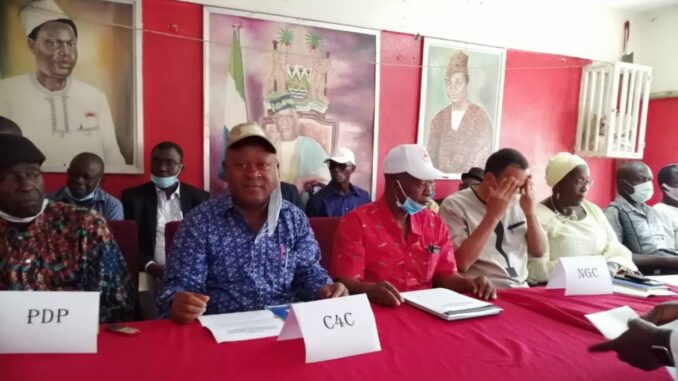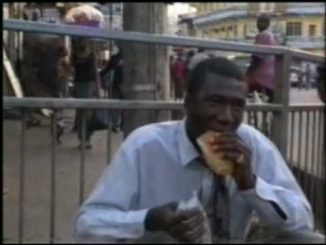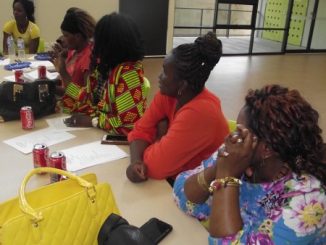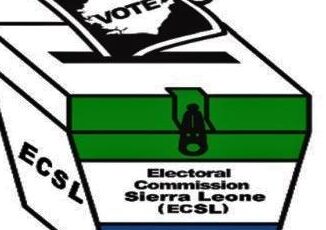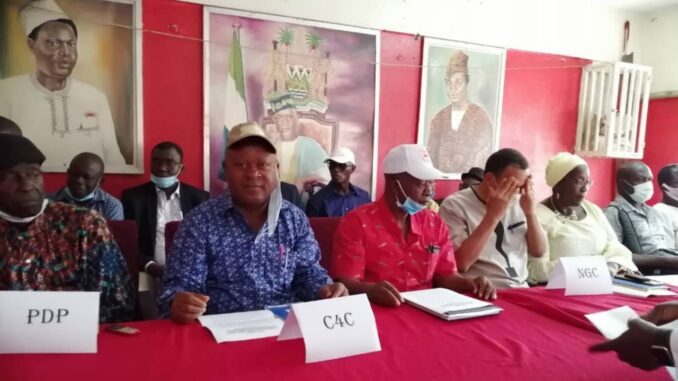
20/06/2022 STATEMENT ON THE CENSUS RESULTS, BOUNDARY DELIMITATION, PROPORTIONAL REPRESENTATION, GROWING ETHNIC TENSION, AND NATIONAL SECURITY***
On behalf of the Consortium of Progressive Political Parties, I welcome you, ladies, and gentlemen of the Fourth Estate, to this briefing.
We have invited you here today to engage you on some issues that we consider to be of grave importance to us all as we continue to struggle for the survival of our democracy and the soul of our nation. I present to you our position on four critical issues as follows: a) The Government cannot and must not use the data provided in the provisional 2021 mid-term census results for any purpose, (including developmental, political, educational, and electoral) because they have clearly been proven to be grossly inaccurate, unreliable, and therefore unusable.
It is now universally acknowledged that the 2021 mid-term population and housing census proposed by the Sierra Leone Government ostensibly to correct errors made in the 2015 census and provide credible data to be used for development purposes has ended up as a complete failure. The process was totally chaotic and dysfunctional, non-inclusive, and technically unsound.
This was a census from which one of the main partners and funders withdrew their support just before counting started because critical technical work had not been “satisfactorily addressed including evaluation of the pilot census, the field operation plan for the enumeration, and ensuring enumerators are adequately trained” (World Bank, 7th December 2021).
The World Bank advised that “All these outstanding actions are necessary and must be addressed prior to commencing data collection to minimize the risk of inadequate and poor data quality.” However, SSL ignored this warning and hastily jumped into counting. Apart from these technical issues, it has become clear that Statistics Sierra Leone (SSL), probably due to financial constraints, did not recruit enough enumerators to do the job. Whereas one enumerator is required per enumeration area (EA), only 15,000 enumerators were recruited to cover a total of 23,784 enumeration areas, leaving 8,784 EAs out completely. Even with this insufficient number of enumerators, many of them appeared not to have completed their work. This is confirmed by SSL in their notice dated 2nd June 2022 entitled “payment of all outstanding allowances to 2021 Mid-Term Population and Housing Census Field Staff”.
In that notice, the Census Programme Manager not only confirmed that enumerators had not been paid up to the date of publication of the provisional results but also that not all of them had completed their work. He differentiated between those who had completed between 51% and 70% of their workload, those who did between 31% and 50%, and the last category comprising those who completed only between 1% and 30%. It is not surprising therefore that the data published by SSL in the provisional results on 1st June 2022 was so extremely inadequate and unconvincing. In addition, there was a high level of abstention as well as many willing citizens complaining that enumerators did not visit their neighborhoods. The result, therefore, paints a very wrong picture of the demography of Sierra Leone at the moment.
Whereas the Mayor of the capital city of Freetown is struggling to cope with the massive migration of people into the city and the resultant proliferation and expansion of slum settlements as evidenced by statistical research backed by satellite imagery, the census reports an incredible 42% decrease in population over the past seven years.
On the contrary, the report registers over the same period extraordinary increases in population in areas where there is no evidence of any mass inward population movements. Interestingly, these are districts that are known to have strong traditional support for the ruling Sierra Leone Peoples Party (SLPP).
The problem is that it will be a development disaster for any Government to attempt to use the data from such a census to plan the development of communities and allocation of resources: localities (in Freetown, for instance) that are known to be overpopulated will be allocated less or inadequate resources, whereas others with less population will receive disproportionate levels of support.
These flawed results can also not be used for educational purposes simply because they are not correct. Teaching children that the population of Freetown dropped by almost half in seven years and that Kenema or Bo has a higher population than the capital city will be most unfair, dishonest, and confusing for children that are learning about rural-urban migration and the factors that determine it. And since these data are wrong and not usable for development purposes, they should not be used for the delimitation of electoral boundaries either.
This Government must not be allowed to disregard the truth so openly and brazenly manufacture a census to achieve its undemocratic designs, as that will be deeply provocative and tantamount to oppression. We, therefore, call on the Government and international partners to ensure that the provisional results for the 2021 mid-term census are not certified or legislated and not utilized for boundary delimitation, development or education.
b) The international community must immediately step in to avert civil conflict in Sierra Leone due to the steady rise of tribal hate sentiments that have been flooding the social media in the past few weeks from citizens claiming to be influential and those responding to them. This is the very first time in the history of Sierra Leone that tribe has become such a factor of division. Our attention has been drawn to several audio and text messages by Sierra Leoneans at home and abroad that are openly tribalistic and hateful and in some cases beating drums of war. Even during the darkest days of our history when a civil war was prosecuted in Sierra Leone, the conflict was never of an ethnic nature. It is a symptom of failures in governance that some citizens are today being driven to regard themselves not as Sierra Leoneans but as members of an ethnic group that feels their identity or even existence is under threat.
Sierra Leoneans have earned great admiration from the world as a resilient nation with excellent democratic credentials having twice peacefully transferred power from Government to opposition even after a decade-long brutal conflict and having fought together and survived at least two major pandemics.
We cannot afford to descend now into the unknown waters of ethnic conflict. Nor will the world, which is saddled with other tough challenges currently, be ready to show us the same level of goodwill and support they did in the past. It is therefore important that all parties, especially the Government take immediate measures not to exacerbate the rising tensions but work in collaboration with opposition and genuine civil society organizations to de-escalate the grave situation. This can only be achieved if the Security forces, especially the SLP, radically revisit their increasingly militaristic and selective approach to policing the people.
c) In these few remaining months before general elections, it is extremely important that Government stops crashing sensitive legislation through Parliament without giving the citizens enough time to understand, digest, and make their decision, especially on matters concerning the exercise of their franchise.
The opposition is aware of the Government’s intention to introduce legislation that would change the system of Parliamentary representation in Sierra Leone from the first-past-the-post to proportional representation. In addition to the fact that there are issues pertaining to the untimely nature of the proposed law (so close to an election), it is also critically important for the general public to be properly educated about it, learning about the model proposed, its merits and demerits and the real reasons for changing the system currently in use. This national debate will dispel all the fears and suspicion that this is just another electoral stratagem to gain undue advantage over the opposition. Whereas those supporting the idea argue that it will be inclusive there are fears that on the contrary
Government intends to apply a threshold that will be so high that many uprising political parties will be completely wiped out. Although advantages such as the reduction of violence and costs have been advanced, there remain concerns about the loss of the sense of representation when legislators are chosen by the party instead of being voted for directly by constituents. Therefore, we submit that there are enough reasons for such a delicate matter to be given adequate time for debate at all levels of society, by voters including students, workers, religious, etc. to gain sufficient buy-in from those that the law will be affecting. Accordingly, we propose that the people of this country be spared another controversy at this time and that the issue of proportional representation is deferred to the next Government.
d) COPPP recommends that it is time for a national conversation on the security forces in Sierra Leone, particularly the Sierra Leone Police (SLP). It is necessary for the authorities to now have a clear idea of how the public assesses the security sector in general and the police in particular, with a view to determining whether the service that they have been providing has been satisfactory. It will be an opportunity to discuss the recurrence of human rights issues and using the case study of bye-elections, to examine the very high risks of brutality and lack of impartiality on the part of SLP in the next elections.
The SLP today is extremely militarized, and it has become abundantly clear, judging from the manner in which they have been arresting, detaining, and using extreme force on citizens, even the mentally challenged are not spared. The SLP currently sees itself more as a protector of the people in power than of the defenseless citizens.
It is our view in COPPP that if the SLP continues to work until the next election in the manner it has been functioning recently, it will become a huge part of the problem rather than of the solution. It is important to stress that when we refer to the SLP here, we actually mean the current leadership of the force and not the obedient men and women who simply obey orders from their superiors.
Furthermore, as the 2023 election approaches, we are seriously concerned with the proliferation of new security types that are being given military training and the possibility of former rebels or civil defense forces who are nostalgic of warfare being re-armed to operate now as political agents. A case in point is the so-called Forest Guards who seem to be more like combatants operating in urban settings (sometimes embroiled in clashes with the regular police force) than in a forest environment. In conclusion, COPPP would like to reiterate our position as follows:
1. That Government cannot and must not use the data provided in the provisional 2021 mid-term census results for any purpose, (including developmental, political, educational, and electoral) because they have clearly been proven to be grossly inaccurate, unreliable, and therefore unusable.
2. That the international community must immediately step in to avert civil conflict in Sierra Leone due to the steady rise of tribal hate sentiments that have been flooding the social media in the past few weeks from citizens claiming to be influential and those responding to them.
3. That in these few remaining months before general elections, Government stops crashing sensitive legislation through Parliament without giving the citizens enough time to understand, digest and make their decision, especially on matters concerning the exercise of their franchise such as the Proportional representation which we suggest must be deferred to the next Government.
4. That a national conversation be held without any delay on the security forces in Sierra Leone, particularly the Sierra Leone Police (SLP). But it is also important that the entire security sector be examined, assessed and public input sought on actions to be taken to restore confidence in the forces. END

